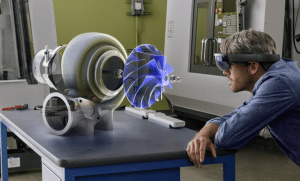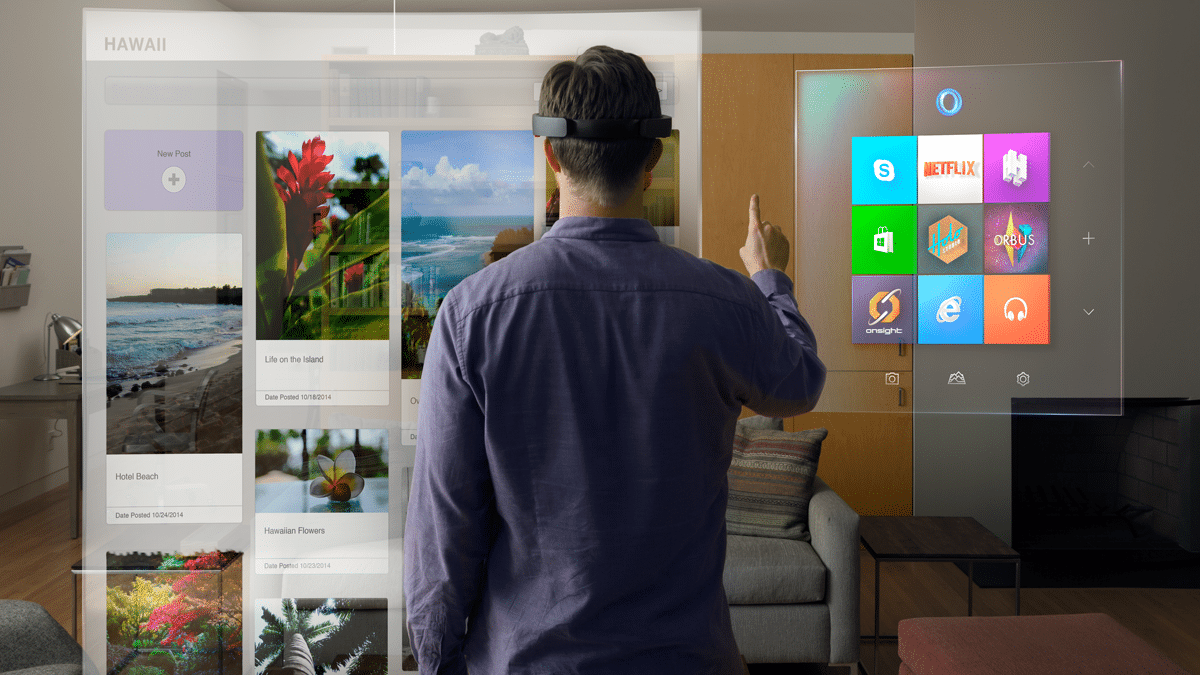Imagine you are in a coffee shop. You work for a global organization that has a workforce all over the world. These workforces are different though, they are not in one office but dispersed in coffee shops, at home, and co-working spaces. You slip on your company-issued Hololens, and the suite of Microsoft tools pop up to help you get stuff done. Next, log into your companies proprietary network and software which allows you to see everyone on your team, virtually. You connect to each one as if you were sitting right next to them – all the while observing what is happening around you – this is not virtual reality but augmented reality.
 Now, picture a manufacturing floor of a global electronics company, you know the one that designs in the US, but manufactures overseas. It is your first day, and you are nervous. The expectations are high and making a mistake is very costly. Your human on-boarding buddy guides you to your workstation and points to what looks like a high-tech pair of sunglasses. However, instead of just looking cool, they are a pair of augmented reality (AR) glasses. You put them on and there in your view is your virtual on-boarding buddy, ready to take you through your first day’s training. Each movement you learn, rehearse and execute is all within both a real and augmented environment. You get real-time feedback on your performance and inputs from the AR device on how to assemble or place parts while the company gathers data on your productivity for that session. You can scroll through your daily reports and get real-time feedback on your performance while sitting on the manufacturing floor and working. No classrooms and no virtual worlds – this is on the job training 2.0.
Now, picture a manufacturing floor of a global electronics company, you know the one that designs in the US, but manufactures overseas. It is your first day, and you are nervous. The expectations are high and making a mistake is very costly. Your human on-boarding buddy guides you to your workstation and points to what looks like a high-tech pair of sunglasses. However, instead of just looking cool, they are a pair of augmented reality (AR) glasses. You put them on and there in your view is your virtual on-boarding buddy, ready to take you through your first day’s training. Each movement you learn, rehearse and execute is all within both a real and augmented environment. You get real-time feedback on your performance and inputs from the AR device on how to assemble or place parts while the company gathers data on your productivity for that session. You can scroll through your daily reports and get real-time feedback on your performance while sitting on the manufacturing floor and working. No classrooms and no virtual worlds – this is on the job training 2.0.
 Sound like science fiction? A Marvel movie with Ironman perhaps? Well, I have seen the future and predict that platforms, service providers, and hardware companies who are focused on developing training programs in augmented reality, will soon be the market leaders. Right now, the tech is not ready for mass consumption nor it is affordable for companies to purchase a Hololens for every employee, but if history is right, the tech will get cheaper and better. If there is anything we learned about tech, is that it requires only one piece of hardware (e.g., the iPhone) to change an industry and marketplace. In fact, many companies like Microsoft and Apple are already playing in augmented reality. Apple with its new iPhone X has built-in AR capabilities, and the most infamous attempt at AR was Google’s Glass. It did not go well, but like most tech, the first iterations of it are almost exclusively pretty bad. I mean would any of us carry around a brick mobile phone today? Augmented Reality tech will get better.
Sound like science fiction? A Marvel movie with Ironman perhaps? Well, I have seen the future and predict that platforms, service providers, and hardware companies who are focused on developing training programs in augmented reality, will soon be the market leaders. Right now, the tech is not ready for mass consumption nor it is affordable for companies to purchase a Hololens for every employee, but if history is right, the tech will get cheaper and better. If there is anything we learned about tech, is that it requires only one piece of hardware (e.g., the iPhone) to change an industry and marketplace. In fact, many companies like Microsoft and Apple are already playing in augmented reality. Apple with its new iPhone X has built-in AR capabilities, and the most infamous attempt at AR was Google’s Glass. It did not go well, but like most tech, the first iterations of it are almost exclusively pretty bad. I mean would any of us carry around a brick mobile phone today? Augmented Reality tech will get better.
According to Training Magazine, the training industry is a $90 billion industry in 2017, a staggering 32.5% increase from 2016. So, if I were to take two bets, the hardware to place bets on is the Hololens. Microsoft already naturally plays in workforce productivity, so integration with productivity tools like email and word is natural, plus they already have the security and scale most large enterprise companies would require. Regarding platform, I continue to think that Microsoft can own this space too, but I suspect like iOS, there will be many startups building apps for the platform. For services, it is wide open. Training companies that start thinking of AR as a platform to deliver critical on the job, onboarding and soft-skills training will be the market leaders. They must invest now in how to build real-time feedback training programs that combine both the real and augmented worlds for all industries. Microsoft already has a Holographic Academy to help with creating applications and services on top of the Hololens technology.
In this augmented world as you type an email you will hear a voice instructing you about tone, grammar, subject and other things in real-time. It will not be as bad as when mom comes over to your apartment, but it will provide critical feedback that you need, right at the moment you need.




0 Comments